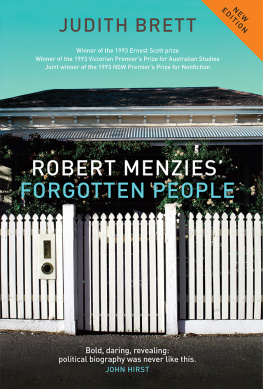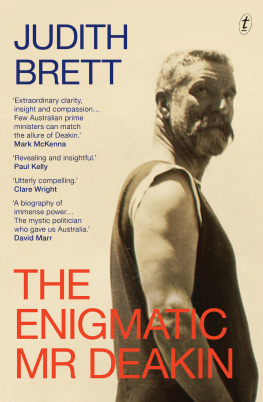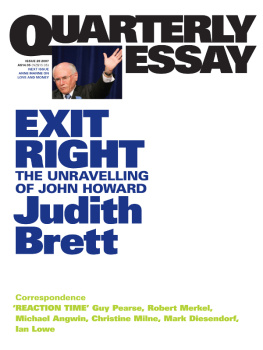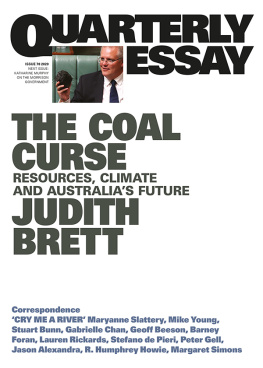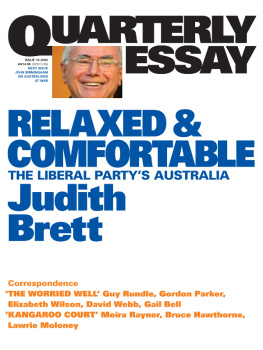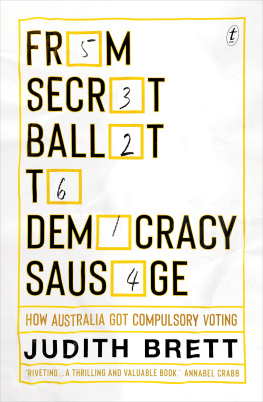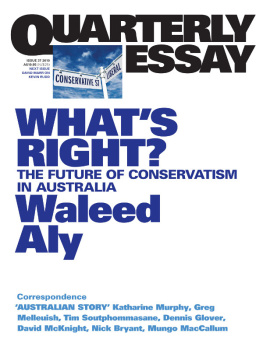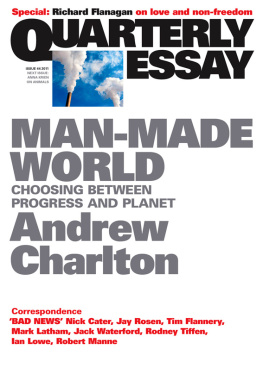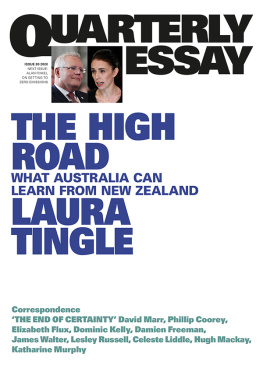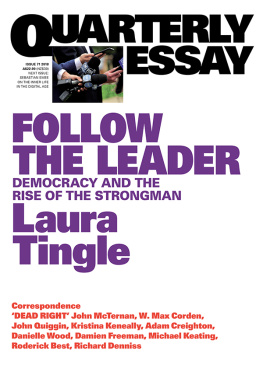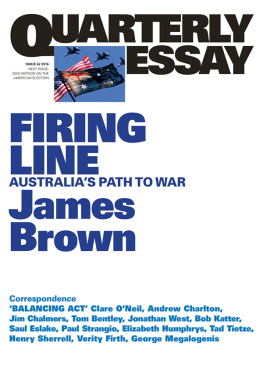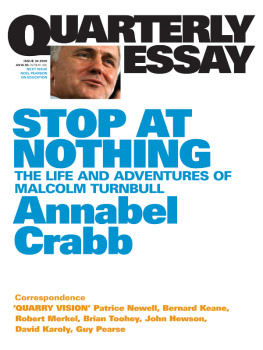Copyright
Quarterly Essay is published four times a year by Black Inc., an imprint of Schwartz Media Pty Ltd.
Publisher: Morry Schwartz.
e-ISBN 9781921870323 ISSN 1832-0953
All Rights Reserved.
No part of this publication may be reproduced, stored in a retrieval system, or transmitted in any form by any means electronic, mechanical, photocopying, recording or otherwise without the prior consent of the publishers.
Essay & correspondence retained by the authors.
Subscriptions 1 year (4 issues): $49 within Australia incl. GST. Outside Australia $79. 2 years (8 issues): $95 within Australia incl. GST. Outside Australia $155. Payment may be made by Mastercard or Visa, or by cheque made out to Schwartz Media. Payment includes postage and handling. To subscribe, fill out and post the subscription card or form inside this issue, or subscribe online:
www.quarterlyessay.com
subscribe@blackincbooks.com
Phone: 61 3 9486 0288
Correspondence should be addressed to:
The Editor, Quarterly Essay
3739 Langridge Street
Collingwood VIC 3066 Australia
Phone: 61 3 9486 0288 / Fax: 61 3 9486 0244
Email: quarterlyessay@blackincbooks.com
Editor: Chris Feik. Management: Sophy Williams, Caitlin Yates. Publicity: Elisabeth Young. Design: Guy Mirabella. Assistant Editor/Production Coordinator: Nikola Lusk. Typesetting: Duncan Blachford.
Printed by Griffin Press, Australia. The paper used to produce this book comes from wood grown in sustainable forests.
Fair Share
Country and City in Australia
Judith Brett
We live in a big country and should all share the cost. Bruce Evans, ABC Country Viewpoint , 11 February 2002
In the days after the 2010 election, as both Julia Gillard and Tony Abbott courted the votes of the independents in the hope of winning the crucial one or two seats that would deliver them government, the voice of the Australian country re-asserted itself. Three of the four independents were from rural Australia: Tony Windsor, who has held the seat of New England in New South Wales since 2001; Bob Katter, member for the huge, far north Queensland seat of Kennedy since 1993; and Rob Oakeshott, who first won the NSW coastal seat of Lyne at a by-election in 2008. All had once been members of the National Party.
The styles were different: Tony Windsor in his short-sleeved, open-necked shirt was thoughtful and courteous; Bob Katter aggressively flamboyant with his wide-brimmed Stetson worn indoors and out; and Rob Oakeshott didnt know when to stop talking. But they all articulated arguments and claims which had a long history in Australian political life and had been scarcely heard in an election campaign centred on the marginal seats of the capital cities.
In August last year, as we waited to see whether Labor or the Coalition would form the government, Tony Windsor and Bob Katter talked to Leigh Sales on the ABCs Lateline . Rob Oakeshott couldnt join the conversation because of the poor state of telecommunications outside the capital cities. Sales asked her guests about the population debate.
Tony Windsor: Its been a debate thats been politically marketed into Western Sydney because thats where both of them think that the balance of power will be actually determined, the winner will be determined in those western suburbs. And thats a nonsense to have that debate when theres massive regional areas that havent been developed, could be developed theres unused infrastructure in many of these communities and the population could expand and grow in some of these areas, but not in Sydney anymore. Weve done too much of that. But government policy has driven that.
The centralist policies that weve had in the past have all been about driving people into a feedlot, and that feedlots Sydney and suddenly the feedlot is full. And now were talking about closing down the rest of Australia because we cant fit any more people in the feedlot.
Bob Katter: We dont want them to go to the cities. We want to take some of the people out of Sydney and Melbourne and put them where they can have a civilised lifestyle, which we can provide for them in Australia if you drop a series of hydrogen bombs from the back of Cairns, the other side of Mareeba, 30 kilometres from Cairns, all the way across to Broome, you wont kill anybody. Theres nobody living there theres about 95 per cent of the surface area of Australia just cut out the little coastal strip and a little dot around Perth: the populations not much different than when Captain Cook arrived. Theres only 670,000 people living on 95 per cent of the surface area of the country. And, I mean, were talking about overpopulation! Everyone is just moving away from rural Australia, where weve got miles of infrastructure thats not being used, and cramming into the cities. I mean, and theres not the slightest word in all of this election campaign about that problem or repopulating the people into these demographic centres where we can absorb huge amounts of population.
Not only do both men believe in a big Australia and the need to fill the empty land; both also reveal deep-seated assumptions that country life is better. Katter is frank: get people out of Sydney and Melbourne to where they can have a civilised life; Windsors image of the city as a feedlot is rich with unsavoury associations of passivity, overcrowding and the smell of shit.
The country and the city are cultural as well as geographic locations. The brilliant cultural critic Raymond Williams has described the long history of the rivalry between the Country and the City in Western thought. S ince the Romans, cluster s of moral and cultural meanings have formed round these complex words and there have been continuing arguments about which is the best place for people to live: the country with its sturdy independence, nearness to nature and friendly people; or the sophisticated city with its cultural richness and the freedom of anonymity. Thats the upside. But each also has a downside: the city as overcrowded, dirty, full of sin and temptation, a place of alienation and lonely people; the countryside as backward and oppressively conservative, peopled by hayseeds and rural idiots. And so on. The interplay of the virtues and vices of the country and the city is different in different times and places. Sometimes the country will have the upper hand, sometimes the city. But always there will be grievances, as claims about respective virtues and vices are marshalled in political struggles over the allocation of symbolic and material resources.
Since at least the 1970s in Australia the city has had the upper hand and the country has been pushed aside. In fact, by the beginning of the twenty-first century, the word country had all but disappeared from Australias political vocabulary as a word for the settled countryside, replaced by regional for major non-metropolitan centres and rural for areas of sparse population, although regional often does for both. Even country Australias very own political party has abandoned the word: in 1982 the Australian Country Party changed its name to the National Party of Australia in a vain attempt to turn itself from a sectional party of farmers and rural small business into a broad-based conservative party. It is only in country music that the word is common, and even there it is shadowed by the Aboriginal meaning of country to evoke spiritual belonging to ones traditional land.
It wasnt always thus. Once the country believed itself to be the true face of Australia: sunburnt men and capable women raising crops and children, enduring isolation, hardship and a fickle environment, carrying the nation on their sturdy backs. There were reasons for this, as this essay will show. For almost 200 years after white settlement began, city Australia needed the country: to feed it, to earn its export income, to fill the empty land, to provide it with distinctive images of the nation being built in the great south land. This gave the country strong claims for resources and it pushed them hard. In August last year, with the fate of the government again in the hands of country Australians, we heard these claims again, and so too the grievance that the contribution and potential of the country were easily forgotten by politicians chasing city votes.



